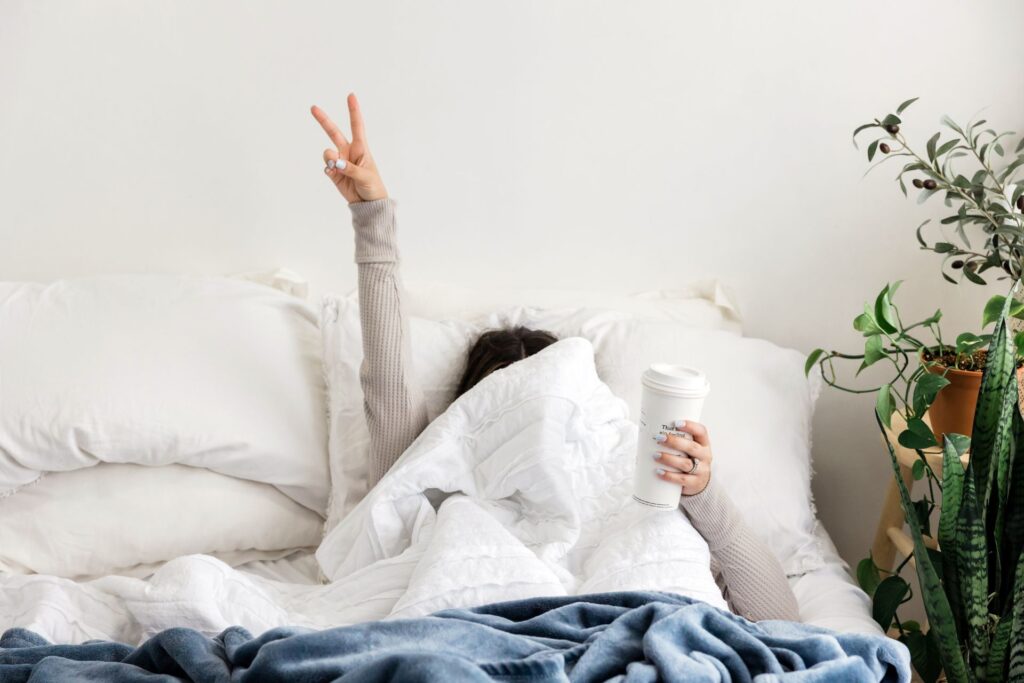Do you feel groggy and fatigued in the morning, even when you prioritise getting eight hours of sleep?
Fortunately, your sleep quality is something you can control.
Here are the five things you may be doing wrong before bed that could be affecting your ability to get quality shuteye (and how to fix each one):
- Drinking Alcohol Before Bed
While it may seem like indulging in a nightcap before bed helps you sleep, alcohol can actually interfere with your sleep cycles. Do you notice that you wake up spontaneously in the middle of the night? This is just what happens once the alcohol wears off.
When you drink alcohol close to bedtime, you’ll generally fall asleep easily… but it makes it harder to enter your deepest sleep stage, REM. When you don’t enter REM sleep, you’ll just wake up feeling exhausted as this is where all the mental and physical recovery happens. To wind down before bed, try having a calming herbal tea instead.
- Not Shutting Down Your Electronics
All of your electronics — including your TV, phone and computer — emit blue light, which is a type of light that tells your body to wake up. This is helpful in the morning, but much less helpful when you’re trying to sleep.
Exposing yourself to blue light in the 1-2 hours before you head to bed can severely impact your ability to fall asleep because it inhibits your body’s melatonin production.
To avoid blue light, you have a couple of options: you can either shut off all your screens for a couple of hours before you hit the hay or try blue-light blocking apps like Flux.
However, if you can, shut everything down and enjoy a book or some conversation which is a much more supportive way to spend your pre-sleep hours.
- Skipping Exercise
Getting regular exercise can help your overall sleep quality and increase the amount of time you spend in deep sleep. Studies have shown that people who exercise are less likely to struggle with insomnia.
Exercise can benefit sleep for many reasons. For one thing, expending energy during the day can leave you feeling more tired and ready for sleep. Also, regular exercise is shown to reduce anxiety and stress, which are both common causes of sleep problems.
- Consuming Caffeine in the Afternoon
You know that your afternoon latte helps you to get through the dreaded afternoon slump but did you know it’s likely affecting your ability to sleep at night?
Relying too much on caffeine can create a vicious cycle because you aren’t able to sleep well at night and then you need to have more and more caffeine in the day to wake up!
A caffeine cut-off hour of one or two o’clock is a good way to make sure every drop of espresso is out of your system by the time your head hits the pillow. This week, try implementing a caffeine cut-off time and see how it affects your sleep.
- Eating a High-Sugar Dessert
We know… desserts are one of the best parts of life. However, having too much sugar too close to bedtime could interfere with your sleep.
When you eat carbohydrate-containing foods, especially those that don’t also contain fiber or protein (looking at you, cupcakes), your blood sugar will spike quickly and fall quickly, like a roller coaster.
To avoid a blood sugar crash that wakes you up in the middle of the night, try having a dessert with less sugar that also has some protein (like a piece of dark chocolate and a handful of nuts).
If you want to know more about our holistic health and lifestyle program reach out through DM today. We offer real-time, face to face, customised support.



